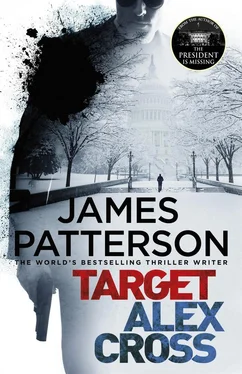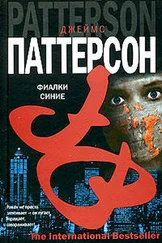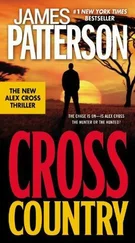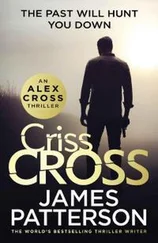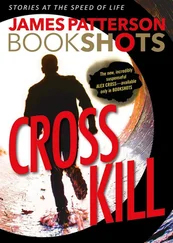My grandmother looked at me, grayer than pale, and said, “It’s like the Cuban missile crisis all over again, Alex.”
Bree hustled into the room. “Explain what happened.”
Jannie said, “Larkin attacked Moscow and Beijing.”
“No,” I said, horrified. “Missiles?”
“No,” Ali said. “Cyberattacks, Dad.”
Nana Mama said, “Larkin ordered CIA hackers to shut down electrical power for ten minutes in those cities and whatever the name of the capital of North Korea is.”
“Pyongyang,” Ali said.
“We can do that?” Bree asked. “Shut down all power?”
“We’ve already done it,” Jannie said.
Up on the screen, the feed cut to President Larkin aboard Air Force One.
He stared into the camera with deep resolve and said, “To authorities in Russia, China, and North Korea, my message is simple. If you continue to hack us, we will be forced to counterattack on a larger scale than what you’ve already seen. If you send missiles, we will respond with quick and devastating force. Your move.”
The screen went blank for a moment and then returned to a flustered morning-news anchor used to delivering fluff. She couldn’t speak at first, and then she broke down. “What’s the point? The nukes could be coming, and I’m sitting in Washington while the president’s off in a jet somewhere trying to start World War Three!”
“See!” Ali said, and he started crying again. “We have to get out of here, Dad!”
“We can’t,” I said. “They’ve still got the city cut off, trying to catch President Hobbs’s assassin.”
Jannie started to cry. “No, Dad, they think he’s already dead.”
“What?” Bree said, shaking her head in confusion.
We’d both been asleep less than five hours, and the world felt like it had changed completely in that time.
Nana Mama was watching the poor news anchor who was being led off camera; her co-anchor looked like he wanted to follow her. My grandmother muted the TV.
She said, “He was in Rock Creek in a wet suit. Some homeless guys living under the Virginia bridge spotted him trying to swim to the Potomac. Multiple soldiers guarding the Thompson Boat Center opened fire on him with machine guns. They feel sure he’s dead. They’re dredging the... there.”
She unmuted the TV. The feed had shifted to a camera on Virginia Avenue aimed at the Thompson Boat Center. Beyond it, police and Coast Guard boats were plying the Potomac, looking for a body.
“Who cares?” Ali said, and he hugged me fiercely. “The Russians are going to nuke us, aren’t they? Or the Chinese?”
Feeling how terrified he was, I kissed him and hugged him back. “No one wants a war like that. Not even our enemies.”
“Then why did the president shut their lights off?”
“Because they were attacking us in the wake of the assassinations. They were trying to see if we were weakened. President Larkin was showing them we aren’t.”
“I’m scared, Dad,” Ali said.
“We’re going to be okay. No one wants a war like that,” I repeated. “You just have to have faith in—”
“But when we can leave, can we?”
I turned to Bree. “Maybe it wouldn’t be a bad idea for Nana Mama and the kids to go see my dad in Florida until things settle down.”
“What?” Jannie said. “No, Dad. My spring season’s coming up.”
“How would we get there?” my grandmother asked. “No planes. No trains.”
“We’ll cross these bridges when we—”
My phone buzzed. Ned Mahoney.
“You rested?” he said.
“Barely. You see what’s going on?”
“Yes, which is why they want us back at Andrews ASAP.”
The rain had stopped at last, temperatures were rising, and the clouds were breaking up when a Gulfstream jet landed at Joint Base Andrews at 2:15 p.m. on Saturday, February 6.
As the jet taxied toward me and the hangar, I kept looking over my shoulder, back inside, to see hundreds of people trying to do their jobs as best they could. But the strain and worry showed.
Ever since President Larkin’s act of brinkmanship, the media had been going crazy, declaring the country on the verge of all-out war with two superpowers and a rogue regime. Protests were breaking out. People were panicking, and there were reports of widespread food shortages, violence, and looting. We were hearing of clogged highways as people fled the country’s larger cities.
But the threat of the entire Eastern Seaboard being leveled as mushroom clouds rose above it was what hung over everyone at Andrews, including me.
All morning I had tried to stay focused on what I could do: review all the new evidence coming in and look for something that would help us get a break. But then up on the screens, there would be some update on the secretary of defense’s status or a piece on CNN about the proper use of gas masks, and I’d be thrown into a loop of what-if questions that destroyed my concentration.
I could see the same happening to many others working the investigation. On the whole, it felt like we were making little if any progress.
Despite hours of searching, dredging, and diving near the confluence of Rock Creek and the Potomac River, there’d been no sign of the guy in the dry suit that the Virginia National Guardsmen had shot at in the early-morning hours.
Had “the Frogman,” as the media was calling him, been the president’s assassin? Why else would someone be in Rock Creek when the city was in total lockdown, the air temperature was in the thirties, and the water temperature was in the forties at best? Plus, he hadn’t been all that far from where Bree had had him almost cornered inside GW University Hospital.
In my gut, the Frogman was the blond minister who killed the president, shot the defense secretary, killed the pathologist, and skinned a corpse. And we’d lost him.
Mahoney tried to convince me that the cold river water could have sunk the corpse, that the body would surface downriver sooner or later. But I wasn’t so sure.
As the Gulfstream rolled to a stop and was surrounded by armed airmen, an alarm started whooping long and slow somewhere in the distance.
Time seemed to stand still.
Many of the airmen had taken their eyes off the jet and were searching the sky. You could see the fear in their faces. I could feel it in mine.
Was there a missile coming?
The alarms were sounding, but would that make a difference? I tried not to think about my family, but it was impossible not to.
I had an image of all of us at Sunday dinner, kidding one another, laughing, and debating the chances of Damon’s team surging enough to make the NCAA championships in March.
But in the next moment, as the Gulfstream’s hatch opened and the ramp unfolded, I was imagining a nuclear blast, fire, and devastating scorching gusts of wind that would leave everything in my life in smoke and ruin.
Had President Larkin made the right decision as a show of power? Or had he provoked our rivals and enemies to take unthinkable actions?
I kept wondering if Larkin was too rash to be leader of the free world. I kept asking myself if he would ever have come remotely close to occupying the Oval Office if President Hobbs, the Speaker of the House, and three members of Hobbs’s cabinet had not been shot down in cold blood.
Agents in SWAT gear exited the Gulfstream, leading a grizzled-looking, sunburned man in denim and handcuffs. Morris Franks, the father of the treasury secretary’s killer, was in his sixties with gray hair and an untamed silver beard. Despite the show of force all around him, Franks didn’t seem frightened as they led him past me. He didn’t seem angry either.
Indeed, when our eyes met for the first time, his affect was so flat, I thought I was looking at a man who had no real emotional center, a man who was dead inside.
Читать дальше
